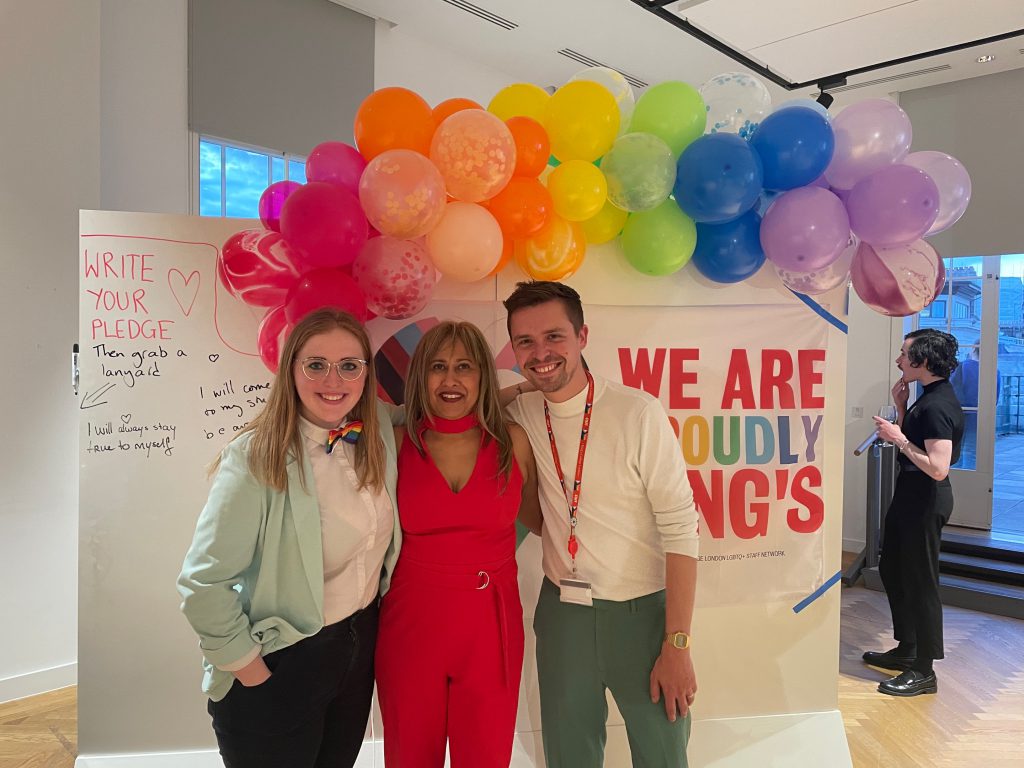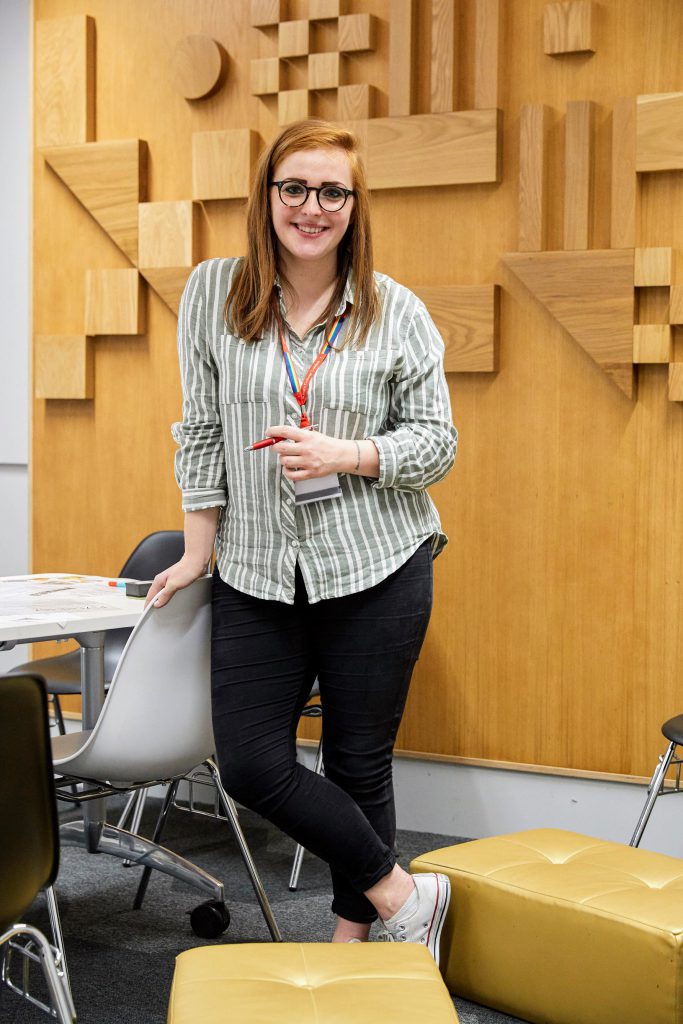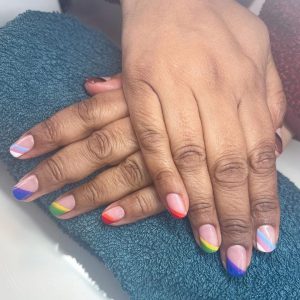King’s College London’s continued commitment to shaping an inclusive environment for LGBTQ+ people at work was recently recognised with a Stonewall Workplace Equality Index Gold Award. King’s achieved 14th place in the Stonewall Top 100 Employer list which is compiled from the Workplace Equality Index, a benchmarking tool for LGBTQ+ inclusion in the workplace. KCL ranked 2nd overall in the higher education sector. You can read the full story here.
To make this momentous occasion King’s College London’s LGBTQ+ staff network’ Proudly King’s & the university’s Equality, Diversity & Inclusion team held a celebration event to recognise & thank all those who contributed to our Workplace Equality Index submission.
In This blog we will be sharing some of the speeches and pictures from the evening, including reflections from Sarah Guerra & Kirsty McLaren.
Content warning: transphobia, queer phobia, racism, sexism, assault, sexual assault and suicide.
Welcoming thoughts – Kirsty McLaren – on behalf of Proudly King’s
Words drawn from Kirsty’s welcoming speech delivered at the celebration event.
Welcome everyone and thank you for joining us to celebrate the Stonewall Gold Award. The last time we handed in our Workplace Equality Index submission, we were handed back a position of 250-something out of 400 employers. There wasn’t any disappointment or pushback, just a real sense of opportunity, because King’s is full of changemakers.
They’re our student-facing staff who work to allow students to have their identities recognised on our systems and the IT staff who implement it. They’re our procurement team who scrutinise the LGBT inclusion of countries and companies in their tender process. They’re our HR staff who make recruitment and onboarding processes inclusive. They are the 500 staff members who’ve worn a rainbow lanyard and pledged their allyship to Proudly King’s. They are every member of staff who’s attended diversity training. They are the EDI officers who led on the Stonewall submission. They are us – Proudly King’s – who welcome everyone bring people together and campaign for change. And every member of King’s who’s made these walls a safe space for people when there wasn’t one at home.
The important thing about us is that we are relentless, and we are never complacent. Even if we hit top marks on every charter mark or index out there, all of us will still be working to make this place even better, and even safer. While this is a celebration of everything we’ve achieved together it should also be a frank reality check for what people are still experiencing. Trans people at King’s and across the world have been cast as the subject of debates without invitation
I remember coming back from a trip in Cornwall and stopping in a service station. On the back of the toilet stall I saw a poster in the back of the toilet saying, “men can dress up as women to assault you, is that what you want?” It was a protesting the gender recognition act. It didn’t make me angry at the people who put it there, just sorry for them and the system we live in that keeps people in boxes and thrives off the vulnerable members of society hating each other. Within King’s, other universities and everywhere imaginable, people have debated trans issues. Universities have pulled out of Stonewall over the debate. Britain’s human rights watchdog has pulled out of Stonewall over the debate. This is debate over where trans people should and should not have space.
But the debate isn’t about space, is it?
It’s about women feeling so afraid to be anywhere in public without sharing their location with loved ones or sending them a quick “I’m home!” message. It’s about being told when you’re little that you can always trust a police officer, and respect what they ask of you, only to find out he’s used his position to harm you. It’s about the 1 in 5 women, the 1 in 6 children, the 1 in 20 men and the 1 in 2 trans people who are sexually assaulted. You don’t have an issue with trans people. You have an issue with the perpetrators. If you haven’t guessed by the statistics, are not trans people. A cisgender man who pretends to be a woman to attack people is not a trans person. Trans people have become the scapegoat for an issue that nobody in power is willing to address. Just this month we saw 80 charities and organisations boycott the UK Government’s first LGBT conference after it changed its mind on banning conversion therapy meaning that trans conversion therapy will not be outlawed. We can’t accept that lesbian, bi and gay folks are more deserving to be safeguarded from self-hate and suicide but trans people are not.
Ever since the start of the LGBTQ+ rights movement, we’ve had conflict within ourselves which only benefits those who have more privilege. The Stonewall Riots which launched the modern movement were started by black trans women who were sick and tired of police brutality. A few years later, they stood on stage at the pride parade to be booed off stage by white, gay, cisgender men and women who ousted them from the very revolution that they had started.
Fast forward four decades to our second ever Pride Parade with Proudly King’s and we are stopped in the blistering sun for two hours because white lesbian groups protested against trans people being included within the LGBT movement. Meanwhile, those who started the movement, black trans women, today have a life expectancy of 35 and it is simply not good enough. We no longer march in Pride in London because they do not protect or empower the most vulnerable members of our community.
Two weeks ago, my fiancé and I went on an impromptu pub crawl around our area. While we were there, we met Luke who is a trans man. Luke was organising a meet-up for a new LGBTQ+ association in our local area. He was sitting on a table by the bar scrawling notes about how to get the word out to people without publicising the date or time. I asked him why he wouldn’t just put up the signs because surely the queers would flock. He told me that this the pub was the only place he had ever managed to get a job, because everywhere else in the area rejected him when they learned he was trans. He said that the last time he had advertised something publicly, the pub was attacked, and he was abused. But he also said that he was questioned about what was in his pants by another member of the LGBTQ+ community at the previous meetup. The pub was the only place he could be safe because he wasn’t safe at home. And even in his safe space, he was targeted as a trans man by the general public and by his own community.
The ultimate goal of those in power in the world is to pull us apart. We are fed ideas by media, politicians and those who profit from keeping us separate and in conflict with one another. Because while we’re doing that, they can continue to thrive in a world that favours cisgendered people, that favours men, that favours able-bodied people and that favours white people. Working intersectionally and empowering every part of a person’s identity is the only way we move forward. Because those in power are terrified of what that would do to the status quo.
We can all do better by Luke regardless of how golden our awards are. This evening I invite you all to celebrate all our achievements and to continue being changemakers.
In this room we have Josh Pullen, who campaigned against the Honorary Degree of the Sultan of Brunei when the death penalty was re-introduced for gay people. Proudly King’s won that battle because he amplified the voices of queer people in King’s and beyond, and – importantly – the university listened.
We also have Professor Evelyn Welch and Sarah Guerra. I’m not sure whether the UK manufactures the size of boot that these women have left for someone to fill. Evelyn has worked at the most senior level to develop a focus on culture, inclusion and diversity among her many other roles. But she has somehow made time to be the Senior Sponsor for:
- Elevate – our gender equality network
- NEST – our parents & carers network
- And our Race Equality network
As well as volunteering and championing our work in Proudly King’s.
Sarah Guerra has spent the last 5 years at King’s leading a team who’ve decreased the gender pay gap, increased the number of female staff at senior level, gained an Athena Swan silver award, a Race Equality Charter Bronze award and a small thing called the Stonewall Gold Award where we ranked 14th in the UK and 2nd among universities.
I want to thank everyone in this room for being here and being a part of making King’s a better place. You’re the reason I’ve never been afraid to bring my whole self to work.
Reflections from Sarah Guerra, Director of Equality Diversity & Inclusion
Words drawn from Sarah’s speech delivered at the celebration event.
It is such an enormous pleasure and privilege to be asked to speak here tonight. I am, as we all know, nearing the end of my time at King’s. I can say these 5 years have genuinely been some of the best working and life experiences I’ve had.
This Stonewall success has meant so much to me. It is the result of strong partnerships and collaboration as well as determination and commitment by so many. Kirsty outlined many of the ways we have worked together collectively to achieve this success. Many across the King’s community have contributed to this success and importantly to the safety and inclusion of our LGBTQ+ colleagues. Everyone here should feel their chests puff with pride.
I want to particularly thank Nicole Robinson, Tyler John, Jordan, Alex Prestage, Evelyn Welch, Paul Webb, Ryan Benjamin, Kirsty McLaren, Chenee Psaros, Josh Pullen, Vanessa Farrier who all have played a role in really driving King’s LGBTQ+ inclusion journey – not forgetting the IOPPN leadership who started King’s relationship with Stonewall before I arrived. They all need special mention for the roles they have played in leading King’s to this success.
While celebrating we must remind ourselves why it is important that we ensure a focus on LGBTQ+ equality. March 31 was #TransDayOfVisibility, and that gives us an opportunity to celebrate trans and non-binary people, and to raise awareness of the discrimination faced by the community worldwide. It also provides an opportunity for trans and non-binary people to feel seen through positive and realistic representation – and for allies to learn more about how they can stand in solidarity.
As I reflected on what to say today, I felt I couldn’t say it better than Lady Phyll that is Phyllis Opoku-Gyimah. Someone I’ve had the privilege to know for maybe 20 years. She is a LinkedIn ChangeMaker, Executive Director of Kaleidoscope Trust, CoFounder of UK Black Pride, A Human Rights Activist, a Community Builder and Organiser and an LGBTQ+ icon.
Lady Phyll said;
“We all have a role to play. Along with sharing trans peoples’ stories far and wide, make sure to support campaigns and mutual aid networks, so that in future trans people can be more than simply visible – they can thrive.”
All over the world we are celebrating the beauty and courage of our trans siblings. While today is a day of celebration and revelation, I want to start the day by highlighting the still very real rise in oppression that trans people are facing that seems to run parallel to their visibility.
With more representation than ever before, the general population are able to learn about the nuanced complexities of the queer community from their phones, televisions and newspapers in new and more informed ways. This being said, it has also armed an extremely vocal minority within our society with the necessary tools to identify and target some of the most vulnerable in our community. Anti-trans sentiments and violence continue to rise all over the world, and the recent ‘Don’t Say Gay’ bill in the United States serves as a reminder that this in turn breeds a redaction of our rights as human beings.
Trans day of visibility is a day of celebration, a day to reach out to and appreciate the trans people in our lives in admiration and respect.
She ends with words that I fully subscribe to –
“I genuinely do believe in the power that positivity and light can have on our community, however I also think that it is vital that the cisgender members of the LGBTQ community take stock of the very real threats that trans people face on a daily basis.”
I wasn’t at the march in London this weekend – but Lady Phyll and all those who came out remind us it is time for our allyship to manifest itself in action.
In looking through another lens as to why LGBTQ+ inclusion in the workplace is life changing and can be life saving I was fortunate enough that my brother-in-law brought our family a set of books at Christmas. One of these was called A Dutiful Boy – a memoir of secrets, lies and family love. By Mohsin Zaidi. The Guardian, GQ and New Statesman named it best book of the year. Mohsin grew up in a devout Muslim household and was confronted with the biggest decision he would ever make – to live the life that was expected of him or to live his truth?
Let me tell you in his own words…
(Sarah read a passage of book pages 274-276).
And the final lens – my own – those that know me will know I myself have come to know, accept and share my queerness as a bi Cis woman whilst here at King’s. It is still something I feel a bit weird talking about as I have been happily partnered with someone of the opposite sex for a long while now. I found myself often asking am I queer imposter? Particularly when I, say, see the twitter content that questions people who are in ‘straight’ relationships saying they are queer. Am I appropriating space? Am I jumping on a bandwagon?
No! I have learned more about romantic and physical attraction and their relationship to my sexual orientation -I get to decide for me who I am attracted to or why – not societal norms. As I started to share this news about myself I was interested in the range of reactions I got. From my brother-in-law saying ‘congratulations and welcome’ to a previous work colleague – someone who I felt was very open, saying ‘am I reading correctly that you have made some self-discoveries?’ Yes, I’ve realised I’m bi/queer but no real change in the day to day. ‘Hope your discoveries are not making life too complicated’ – to which I answered, ‘Why would they? I’m the same person’.
This is why I am so grateful for the relationships, conversations and support here at King’s underpinned by our Stonewall membership and our brilliant Proudly network that have helped me come to terms with and understand my own confusion and repressed feelings and experiences. Helped me understand who I am and be happy with that.
Tonight, isn’t about me but my experiences are a big part of why Stonewall membership and support is so vital it provides space, advocacy and education to reduce fear and confusion for individuals and to help organisations understand how to be LGBTQ+ inclusive. Getting this Gold award tells us we are on the right track and to repeat Mohsin’s words – ‘I am unwilling to give up on the idea that things can change’..
I so look forward to seeing King’s leading the conversation after my departure.
Thank you.
If you would like to watch some amateur footage of the speeches delivered on the night please contact the team via email (diversity@kcl.ac.uk).
Gaining a Stonewall Workplace Equality Index Gold Award is not a destination. but a small step in our journey to creating a more inclusive world. To get involved with our work and to find out more explore the links below;
- Learn more about our work on our university LGBTQ+ webpages.
- get involved with our staff network Proudly King’s.
- Explore our Trans Matters toolkit.
- Visit our Equality, Diversity & Inclusion intranet webpages.
- Find out more about Stonewall.



